|
|
|
Sort Order |
|
|
|
Items / Page
|
|
|
|
|
|
|
| Srl | Item |
| 1 |
ID:
120284
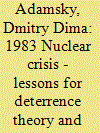

|
|
|
|
|
| Publication |
2013.
|
| Summary/Abstract |
This article distills insights for the scholarship of deterrence by examining the 1983 nuclear crisis - the moment of maximum danger of the late Cold War. Important contributions notwithstanding, our understanding of this episode still has caveats, and a significant pool of theoretical lessons for strategic studies remain to be learned. Utilizing newly available sources, this article suggests an alternative interpretation of Soviet and US conduct. It argues that the then US deterrence strategy almost produced Soviet nuclear overreaction by nearly turning a NATO exercise into a prelude to a preventive Soviet attack. Building on historical findings, this article offers insights about a mechanism for deterrence effectiveness evaluation, recommends establishing a structure responsible for this endeavor, and introduces a new theoretical term to the strategic studies lexicon - a 'culminating point of deterrence'.
|
|
|
|
|
|
|
|
|
|
|
|
|
|
|
|
| 2 |
ID:
008533
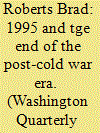

|
|
|
|
|
| Publication |
Winter 1995.
|
| Description |
5-25
|
|
|
|
|
|
|
|
|
|
|
|
|
|
|
|
| 3 |
ID:
001266
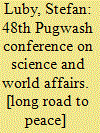

|
|
|
|
|
| Publication |
Queretara, 1998.
|
|
|
|
|
|
|
|
|
|
|
|
Copies: C:2/I:0,R:0,Q:0
Circulation
| Accession# | Call# | Current Location | Status | Policy | Location |
| 040674 | 327.17/PUG 040674 | Main | On Shelf | General | |
| 040675 | 327.17/PUG 040675 | Main | On Shelf | General | |
|
|
|
|
| 4 |
ID:
060745
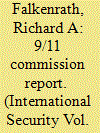

|
|
|
|
|
| Publication |
Winter 2004-05.
|
|
|
|
|
|
|
|
|
|
|
|
|
|
|
|
| 5 |
ID:
021322
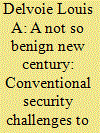

|
|
|
|
|
| Publication |
Winter 2001-02.
|
| Description |
19-35
|
|
|
|
|
|
|
|
|
|
|
|
|
|
|
|
| 6 |
ID:
152414
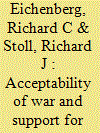

|
|
|
|
|
| Summary/Abstract |
We study the factors that influence citizen support for defense spending in fourteen democracies over the period 2004–2013. We pose two research questions. First, what factors influence citizen support for war and military force? We refer to this as the acceptability of war. Second, in addition to the acceptability of war, what other factors affect support for defense spending? Our principal finding is that citizen acceptance of war and support for defense spending are most influenced by basic beliefs and values. Gender also has a strong negative influence on attitudes toward war and thus indirectly lowers support for defense spending among women. Attitudes toward war and defense spending are also sometimes influenced by short-term threats and by alliance considerations, but the effects are not as substantively meaningful. We conclude with a summary of the results and a discussion of the implications for theory and policy.
|
|
|
|
|
|
|
|
|
|
|
|
|
|
|
|
| 7 |
ID:
167291
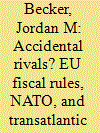

|
|
|
|
|
| Summary/Abstract |
Both theorists and practitioners continue to show interest in transatlantic burden-sharing. Resource allocation choices – both to and within defense budgets – are grand strategic choices, and membership in alliances and security communities affects how states make those choices. International security and political economy scholarship offers plausible explanations for transatlantic imbalances in military expenditures. However, NATO allies and EU member-states have pledged to one another not just to spend more on defense, but to allocate more defense resources to equipment modernization. Current scholarship does not fully explain the sources of such within-budget choices, which would help anticipate the likelihood of such pledges succeeding. Building on work by security scholars, defense and political economists, and scholars of interorganizational relations, I argue that stringent fiscal rules dampen the kind of defense spending NATO and EU strategists seek. Governments respond to increasingly stringent fiscal rules by reducing overall defense expenditures, while at the same time shifting existing defense resources to personnel, and away from equipment and operational expenditures. I find evidence in support of this argument by using education levels in the states in question as instruments for fiscal rules. This phenomenon represents a significant risk for important transatlantic strategic initiatives, namely NATO’s Wales pledge on defense investment.
|
|
|
|
|
|
|
|
|
|
|
|
|
|
|
|
| 8 |
ID:
019660
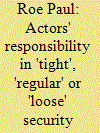

|
|
|
|
|
| Publication |
March 2001.
|
| Description |
103-116
|
|
|
|
|
|
|
|
|
|
|
|
|
|
|
|
| 9 |
ID:
073240


|
|
|
| 10 |
ID:
186048
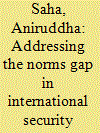

|
|
|
|
|
| Summary/Abstract |
While scholars (mainly from the Global North) in International Relations have been turning to a (critical) constructivist agenda in norms research, the field has increasingly become devoid of applying this area of research in understanding the nuclear behavior of deviant states from the Global South. The paper therefore attempts to bridge this research gap by using the case of the India-US nuclear relationship. To do so, the paper: i) identifies the probable convergences of the existing literature on nuclear policy and the research on constructivist norms, ii) highlights India’s racial treatment as a Southern nuclear state in academia and policy discourse, and iii) recognizes plausible avenues for the expansion of the Western dominated normative research agenda by analyzing India’s nuclear relationship with the US ― with a specific focus to norm contestation and normative change. In bringing together (critical) constructivists and scholars in nuclear politics to further our understanding of how we perceive security of non-western states, this work makes an epistemological and ontological contribution in the field of international security studies.
|
|
|
|
|
|
|
|
|
|
|
|
|
|
|
|
| 11 |
ID:
130159
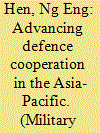

|
|
|
| 12 |
ID:
130331
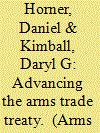

|
|
|
|
|
| Publication |
2014.
|
| Summary/Abstract |
Thomas Countryman took office as assistant secretary of state for international security and nonproliferation on September 27, 2011. He joined the U.S. Foreign Service in 1982. He was lead negotiator for the United States in the talks that produced the Arms Trade Treaty (ATT) last year. Arms Control Today spoke with Countryman in his office on March 12. Countryman was joined by William Malzahn, senior coordinator in the Office of Conventional Arms Threat Reduction. In the interview, Countryman explained the reasons that the United States signed the ATT, addressed domestic criticism of the pact, and looked ahead to the challenges that the treaty faces.
|
|
|
|
|
|
|
|
|
|
|
|
|
|
|
|
| 13 |
ID:
048496
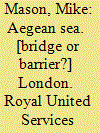

|
|
|
|
|
| Publication |
London, Royal United Services Institute for Defence Studies, 2001.
|
| Description |
73p.
|
| Series |
Whitehall paper no: 54
|
|
|
|
|
|
|
|
|
|
|
|
Copies: C:1/I:0,R:0,Q:0
Circulation
| Accession# | Call# | Current Location | Status | Policy | Location |
| 045252 | 551.4628/MAS 045252 | Main | On Shelf | General | |
|
|
|
|
| 14 |
ID:
132531


|
|
|
|
|
| Publication |
2014.
|
| Summary/Abstract |
Afghanistan has been the global epicenter of heroin production for the past decade. Heroin networks and drug lords present a principal impediment to security, state building, and democratic governance. Beyond the national boundaries, Afghan-originated heroin creates enormous challenges for international security by financing terrorism, instigating corruption, killing nearly 100,000 users worldwide every year, undermining public order, and debilitating economic development. The devastating impacts of the Afghan heroin trade have spilled over into Southwest Asia, Central Asia, Russia, China, the Balkans, and Europe. Because Turkey stands on the shortest transit pathway between Southwest Asia and Europe, it is intensively exposed to illicit flows of Afghan heroin along the Balkan Route. Transnational crime syndicates have been exploiting Turkish territories for decades for the purpose of trafficking heroin to European markets. This paper discusses Afghan heroin as an international security conundrum. It further seeks to explore the dimensions of the threat in Turkey, new patterns in heroin trafficking, and profiles and operation modes of transnational syndicates. The analyses are based upon the scrutiny of important case files, national seizure database, and annual KOM provincial questionnaires. In conclusion, the paper puts forward policy recommendations for security elites both in Turkey and in other states affected by the illicit trade of Afghan heroin.
|
|
|
|
|
|
|
|
|
|
|
|
|
|
|
|
| 15 |
ID:
122758
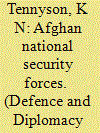

|
|
|
| 16 |
ID:
095160
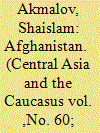

|
|
|
|
|
| Publication |
2009.
|
| Summary/Abstract |
For three decades now the country has been struggling for survival amid a never-ending armed conflict that makes a concerted foreign policy course impossible. This is fraught with a loss of statehood and is responsible for Afghanistan's role and place in the international relations system.
|
|
|
|
|
|
|
|
|
|
|
|
|
|
|
|
| 17 |
ID:
030707
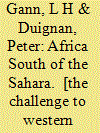

|
|
|
|
|
| Publication |
Stanford, Hoover Institution Press, 1981.
|
| Description |
xiv, 114p.
|
| Series |
Hoover Press Publication; no. 238
|
| Standard Number |
0817973826
|
|
|
|
|
|
|
|
|
|
|
|
Copies: C:1/I:0,R:0,Q:0
Circulation
| Accession# | Call# | Current Location | Status | Policy | Location |
| 019617 | 355.033067/GAN 019617 | Main | On Shelf | General | |
|
|
|
|
| 18 |
ID:
094701
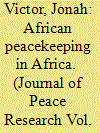

|
|
|
|
|
| Publication |
2010.
|
| Summary/Abstract |
Since the end of the Cold War, sub-Saharan African states have substantially increased their participation in international peacekeeping operations in Africa. Their contributions have become highly valued and even facilitated by major powers. This article examines why certain African states might contribute more than others to peacekeeping. In particular, prominent arguments are considered about the primacy of regime security concerns and the dynamics of warlord politics in the foreign policymaking of African states, the economic incentives of peacekeeping, and the importance of African states' concerns over their state legitimacy and territorial integrity. First, this study investigates the possibility that peacekeeping might be utilized as a diversionary strategy to divert the attention of both an African state's military and major powers from a regime's misrule. Second, this study examines the extent to which financial and material assistance from donor states encourages poorer states to engage in peacekeeping. Third, the study investigates whether states with less legitimate and more arbitrary borders might have greater incentive to contribute to peacekeeping operations to promote the territorial status quo in Africa. Empirical evidence from a quantitative analysis across 47 states of sub-Saharan Africa from 1989 to 2001 suggests that states that are poorer, with lower state legitimacy and lower political repression, participate more often in regional peacekeeping.
|
|
|
|
|
|
|
|
|
|
|
|
|
|
|
|
| 19 |
ID:
123456
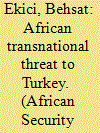

|
|
|
|
|
| Publication |
2013.
|
| Summary/Abstract |
Africa has emerged as a strategic location for transcontinental narcotics trade. Particularly the West African subcontinent has turned into a cocaine warehousing and trans-shipment hub along the way to the European underground markets. At this juncture, African drug networks (ADNs) began to play a momentous role in global drug trade, and pose a considerable threat to international security, as they operate in more than 80 countries. The United Nations Office on Drugs and Crime, Interpol, and Europol perceive ADNs as one of the primary issues in international counter-narcotics policy. These agencies have launched several multilateral initiatives to contain the West African threat. None of these initiatives, however, retarded the expansion of the problem. Indeed, the containment efforts turned out to be quite embryonic. The ADNs eventually entered the Turkish market by the early 2000s. West African drug networks (WADNs) in particular have begun to operate within Turkey extensively, often supplying and distributing drugs. The gravity of the threat became ever more serious by 2012. The upsurge of the new threat has compelled the Turkish drug-law enforcement agencies to adopt new policies and counter-strategies. These policies have to be based upon proper strategic analysis of the threat. This paper seeks to address the need for a threat assessment of ADNs. It investigates the dimensions of the problem, profiles the members of WADNs, their modes of operation, and the factors that compelled them to exploit the illicit Turkish drug markets. The analyses are based upon the scrutiny of 227 narcotic interdictions files and statements from the African individuals in these case files. The paper concludes by presenting policy implications and recommendations for the Turkish security and foreign-policy institutions to cope with this impending threat.
|
|
|
|
|
|
|
|
|
|
|
|
|
|
|
|
| 20 |
ID:
064534
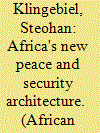

|
|
|
|
|
|
|
|